In 2021, Médecins Sans Frontières (MSF) assisted people in several areas of northern Syria, where we could negotiate access and the security situation was safe enough for us to work. Our teams provided trauma and wound care, maternal and child health services, mental health support and treatment for chronic diseases in hospitals, health centres, mobile clinics and displaced persons camps. Our delivery of lifesaving cross-border assistance to northern Syria continued to be compromised, as only one of the three border crossings authorised by the United Nations remained open in the northwest, and the Semalka/Fishkhabour crossing point, on the northeast border with Iraqi Kurdistan, was sporadically closed.
Northwest Syria
Though the intensity of the fighting has decreased since the ceasefire signed in March 2020, some 2.7 million people remain displaced and live in precarious conditions. In 2021, civilian areas and infrastructure, including medical facilities, came under direct fire and thousands of people were killed, wounded or displaced.
To address the medical needs in Idlib and Aleppo governorates, where the healthcare system remains very fragile, we supported eight hospitals, including the only specialised burns unit in the area. We also ran mobile clinics and supported health centres to provide care to displaced people living in camps. Our services included obstetric care, treatment for infectious and chronic diseases, as well as skin conditions related to the poor living conditions, such as scabies and leishmaniasis. We also started offering mental health support to people deeply traumatised by over a decade of conflict.
In the camps, our teams worked to improve water supply and sanitation facilities, for example by building latrine blocks and providing commodes for people with disabilities, and distributed hygiene kits and relief items, such as blankets and heating materials, to help people cope with the cold winter weather. We also ran community-based surveillance in the camps to facilitate early detection of medical and humanitarian needs.
Although the number of people in need of assistance grew in 2021, humanitarian funding continued to fall, and MSF received an increasing number of requests to support hospitals and health centres facing frequent shortages of essential medicines and medical supplies. To cover critical gaps in care, we expanded our sexual and reproductive health services and our water, sanitation and hygiene activities.
The already enormous needs in the region were exacerbated by the COVID-19 pandemic in 2021, as northwest Syria experienced its most severe wave of infections to date. We reopened our isolation centres in Idlib governorate and community treatment centres in Afrin and Al-Bab, in Aleppo governorate. We also supported a COVID-19 paediatric unit, implemented home-based care for patients not needing hospitalisation and distributed COVID-19 prevention kits in the camps (containing masks, hygiene materials and information about the virus). Efforts to contain the virus were hindered by the low vaccination rate – only three per cent of the total population were fully covered by the end of 2021. In response, we sent health promotion teams to spread messages about the safety and efficacy of COVID-19 vaccines.
Northeast Syria
The people of northeast Syria have continued to suffer from the compounding effects of 11 years of conflict, with displacement, insecurity, an economic crisis and inhibited access to basic services creating a range of humanitarian needs across the region. For example, the Alouk water station suffered repeated interruptions, leading to episodic water shortages for up to one million people in Hassakeh governorate.
MSF has responded across Hassakeh, Aleppo and Raqqa governorates to the persistent and emerging humanitarian needs in the region. Throughout the year, we supported a large basic healthcare centre in Raqqa to provide emergency, outpatient and non-communicable diseases (NCD) care. We also supported the local health authorities to provide routine vaccinations to women and children in 12 locations in Kobanê/Ain Al-Arab and across Aleppo governorate.
In Tal-Abyad and Ras Al-Ain, we partnered with local organisations to re-establish routine immunisation services and conducted a measles vaccination campaign.
In June, we responded to a rise in the number of malnourished children by setting up an inpatient therapeutic feeding centre in Raqqa, alongside our outpatient centre. In August, we started providing basic healthcare and treatment for tuberculosis for adolescent detainees in a detention centre in Hassakeh city. And in September, we started to support a new clinic treating NCDs in the southern neighbourhoods of Hassakeh city.
Al-Hol camp, in Hassakeh, continues to be an unsafe place for people to live. The camp, which hosts around 57,000 people, mostly women and children, saw repeated violent incidents throughout 2021. This led to the deaths of many camp residents, including one MSF staff member in January, as well as repeated interruptions to the provision of humanitarian assistance.
MSF provided basic healthcare, treatment for non-communicable diseases, COVID-19 care, mental health support, and water and sanitation services in the camp across 2021. In September, we closed our inpatient therapeutic feeding centre due to very small numbers of patients, and reoriented our assistance to care for NCDs through a new clinic that opened in October. During 2021, we delivered on average over 600,000 litres of water per day to the camp, and worked to ensure continued access to sanitation facilities. Despite these efforts, access to adequate and sufficient water and sanitation facilities remain major problems in the camp.
In 2021, there were also multiple waves of COVID-19 across northeast Syria. MSF supported the Qamishli laboratory, the only PCR testing facility in the region, with essential testing materials to try to avoid critical ruptures. In collaboration with local partners, MSF cared for people with suspected or confirmed COVID-19 in treatment centres in both Hassakeh and Raqqa, and donated medical supplies to health facilities across the region to help them respond to COVID-19.







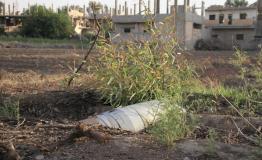
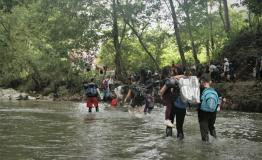
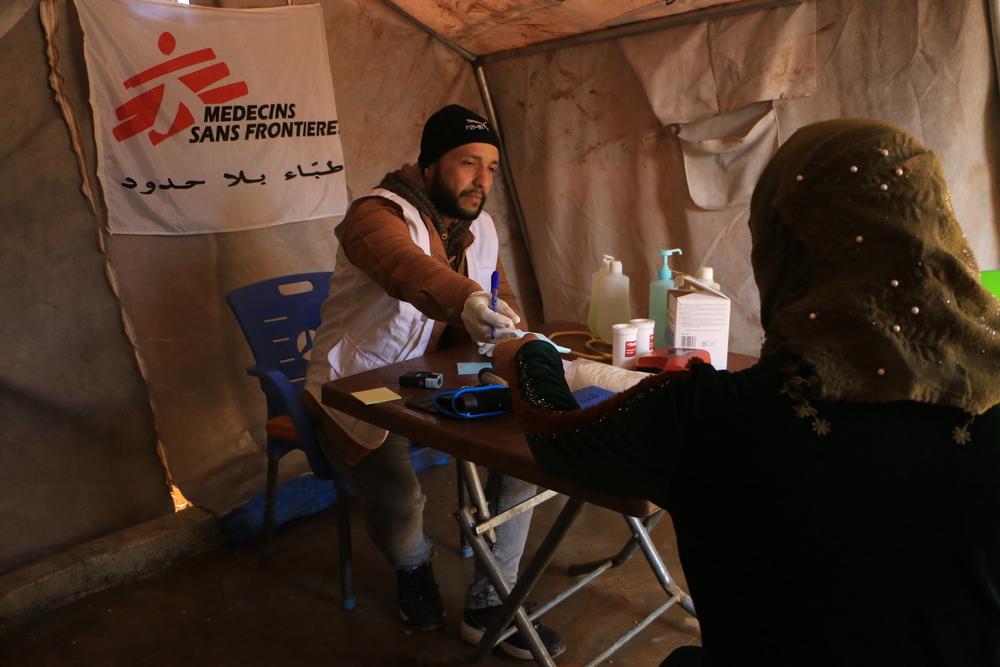
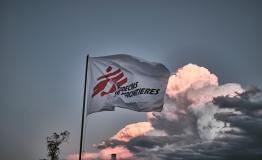
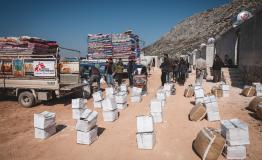
![14 MSF trucks loaded with tents and winter kits crossing into northwest Syria [© Abdulmonam Eassa/MS] 14 MSF trucks loaded with tents and winter kits crossing into northwest Syria [Abdulmonam Eassa/MS]](/sites/default/files/styles/card_half/public/msfimages/news/msb149033_medium.jpeg?itok=ormxHDKW)